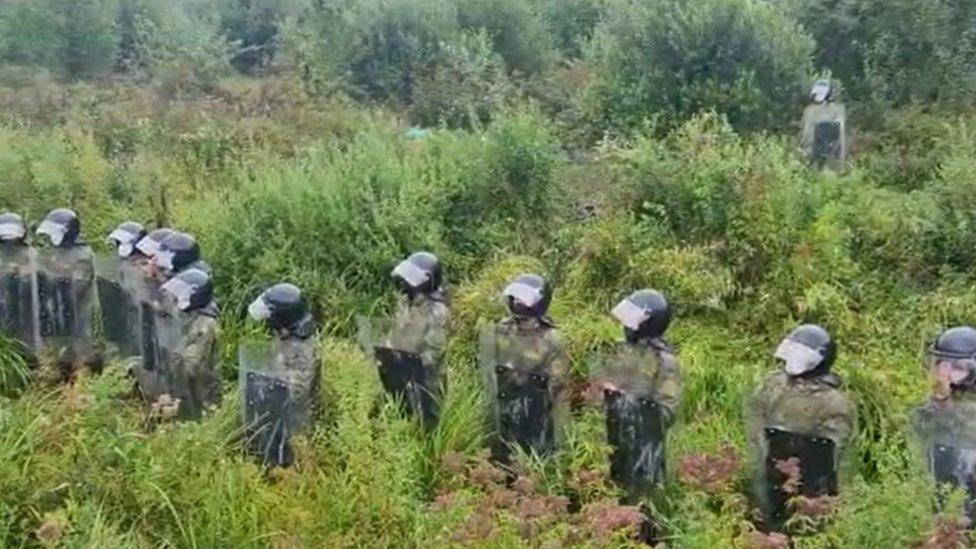Belarus migrants: Poland faces fresh border breaches
- Published
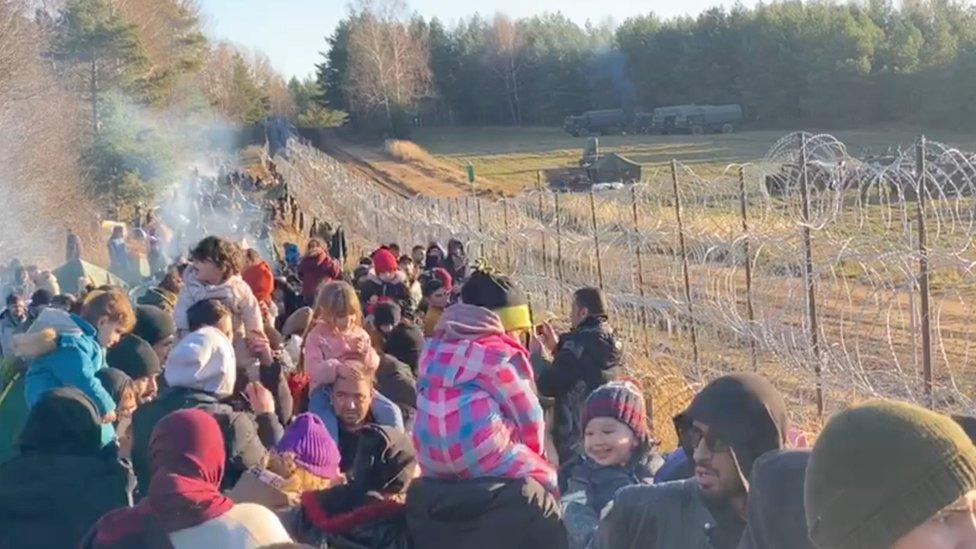
At least 2,000 people are now gathered at the Belarusian border with Poland
Poland faced "many attempts" to breach the border with Belarus overnight but now has 15,000 troops to repel them, the defence minister has said.
Several thousand migrants have become stranded at the border, at the centre of an escalating international row.
For months, the EU, and now Nato and the US, have accused Belarus's authoritarian leader of provoking a renewed migrant crisis in Europe.
Ever-increasing numbers have headed to Belarus's borders with the EU.
Alexander Lukashenko, who won a largely discredited election last year, denies luring would-be migrants - mostly from the Middle East - to the EU's borders in retaliation for sanctions imposed since he brutally cracked down on protesters and opponents.
The situation has come to a head this week with repeated attempts to tear down the razor-wire fence erected on Poland's eastern frontier.
"It wasn't a calm night. Indeed, there were many attempts to breach the Polish border," Defence Minister Mariusz Blaszczak told Polish radio.
Police spoke of two separate incidents involving groups of about 50 people. Meanwhile, the border guard said in the past day there had been 599 attempts to cross illegally and that nine people, all from the Middle East, had been detained.
Poland and Belarus have accused each other of violence towards migrants camped near the fence. Those claims are difficult to verify as a BBC team and other journalists have been barred from the area because of a local Polish state of emergency.
However, the defence ministry in Warsaw tweeted a video alleging that a Belarusian soldier fired a shot to intimidate the migrants camped near the fence.
Allow X content?
This article contains content provided by X. We ask for your permission before anything is loaded, as they may be using cookies and other technologies. You may want to read X’s cookie policy, external and privacy policy, external before accepting. To view this content choose ‘accept and continue’.

Overnight temperatures at the border have fallen below freezing and some of the people stranded there have warned they are running out of food and water.
Aid workers complain that Poland's state of emergency means they are unable to enter the affected area: "For us it is heart-breaking. We are here, near the border and we cannot enter the zone and help people. We can only help those who manage to cross the border and make it out of the restricted area," Ania Chmielewska told the BBC.
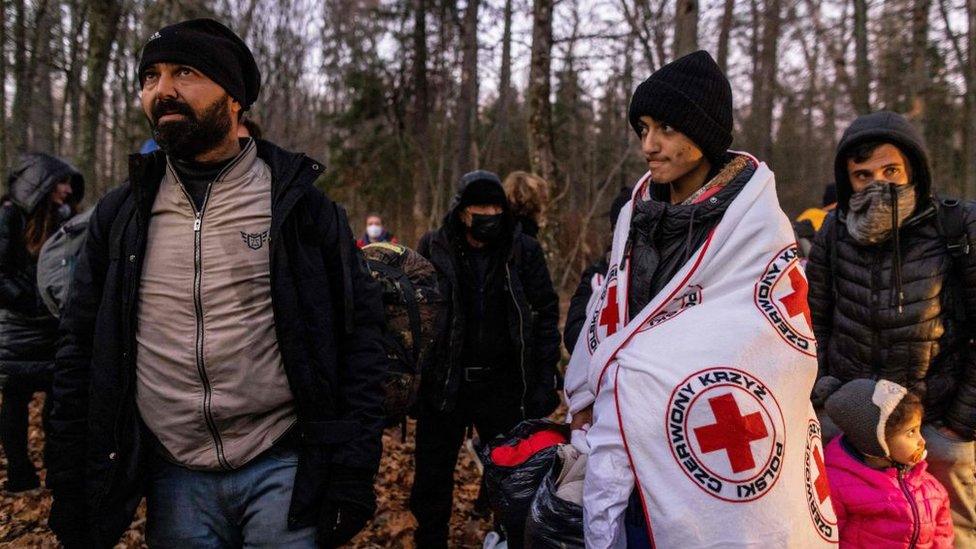
Aid agencies are only able to help migrants who successfully cross the border into Poland and get beyond the immediate zone
The defence minister said earlier attempts had focused on the area around a major border crossing at Kuznica but latest efforts are more spread out. Border breaches have involved the use of bolt cutters and tree trunks, as Polish guards try to fend them off.
Many of the migrants are young men but there are also women and children, mostly from the Middle East and Asia.
The European Commission says Mr Lukashenko enticed migrants with the false promise of easy entry to the EU as part of an "inhuman, gangster-style approach" and it has listed some 20 countries from which migrants have flown into Minsk, mainly on tourist visas.
German Foreign Minister Heiko Maas said on Wednesday that the EU would not be blackmailed. He said the bloc would work to extend sanctions on Belarus: "We will sanction all those who participate in the targeted smuggling of migrants."
Polish Prime Minister Mateusz Morawiecki called on the EU on Wednesday to block flights from the Middle East to Belarus.

What routes do migrants use to reach Belarus?
The capital, Minsk, has regular flights from destinations across the Middle East, including Istanbul, Dubai, Damascus and Baghdad. Belarus state carrier Belavia has daily flights from Istanbul and also serves Beirut and Dubai.
In August, the EU asked Iraqi authorities to suspend all flights from Baghdad to Belarus, but it appears to have been just a temporary measure.
Information from FlightRadar24, which monitors flights in real time, shows a scheduled flight to Minsk due to arrive from Baghdad on Thursday. And there are other indirect routes migrants could use if they wanted to reach Belarus.

The Polish leader earlier accused Russia's President Putin as well as Belarus of trying to destabilise the European Union - which the two countries are not part of - by allowing migrants to travel through Belarus and enter the bloc.
Russia has in turn blamed the EU. Mr Putin's spokesman rejected the Polish prime minister's accusation, saying that "this is nothing other than further attempts to actually strangle Belarus".
German Chancellor Angela Merkel phoned Mr Putin on Wednesday, asking him to press Belarus to stop the "instrumentalisation of migrants", her spokesman said.
Belarus Foreign Minister Vladimir Makei, on a visit to Moscow, said he was looking for mutual support from Russia and blamed the EU for provoking the crisis. In an apparent gesture to Belarus, Russia said it was sending two bomber planes to patrol its neighbour's airspace.

View from Poland's border area

Dozens of Polish police vehicles race to the village of Kuznica where up to 4,000 migrants are effectively trapped.
The area remains out of bounds for media and, crucially, aid agencies - much to their despair.
In September Nick Beake met the migrants freezing on the Belarus-Poland border
One man we contacted, an Iraqi Kurd, told us they'd endured another night in freezing conditions and asked us in exasperation what sort of life this was.
When I then asked what they were all doing for food, he said the Belarusians were providing supplies. But other migrants have also told us the Belarus security forces are also giving out wire-cutters to help break through the fence in places where Poland's numerous guards are thin on the ground.

Poland has been accused of pushing migrants back across the border into Belarus, contrary to international rules of asylum.
"Nobody is letting us get in anywhere, Belarus or Poland," said 33-year-old Shwan Kurd, who described arriving in Belarus at the start of November.
"There's no way to escape," he said. "Poland won't let us in. We are so hungry. There's no water or food here. There are little children, old men and women, and families."



Are you in the area? Have you been affected by what's been happening? You can get in touch by emailing haveyoursay@bbc.co.uk, external.
Please include a contact number if you are willing to speak to a BBC journalist. You can also get in touch in the following ways:
WhatsApp: +44 7756 165803
Tweet: @BBC_HaveYourSay, external
Please read our terms & conditions and privacy policy
If you are reading this page and can't see the form you will need to visit the mobile version of the BBC website to submit your question or comment or you can email us at HaveYourSay@bbc.co.uk, external. Please include your name, age and location with any submission.
- Published9 November 2021
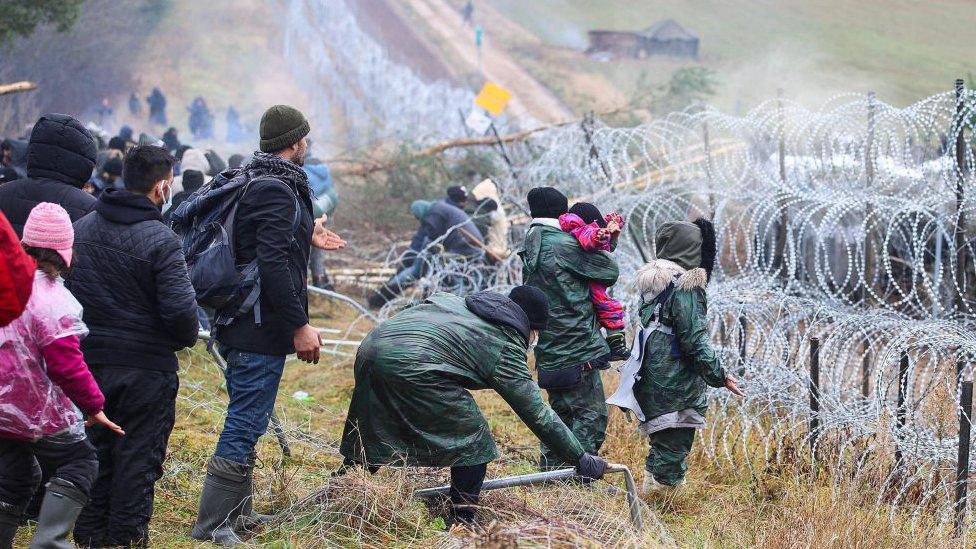
- Published9 November 2021
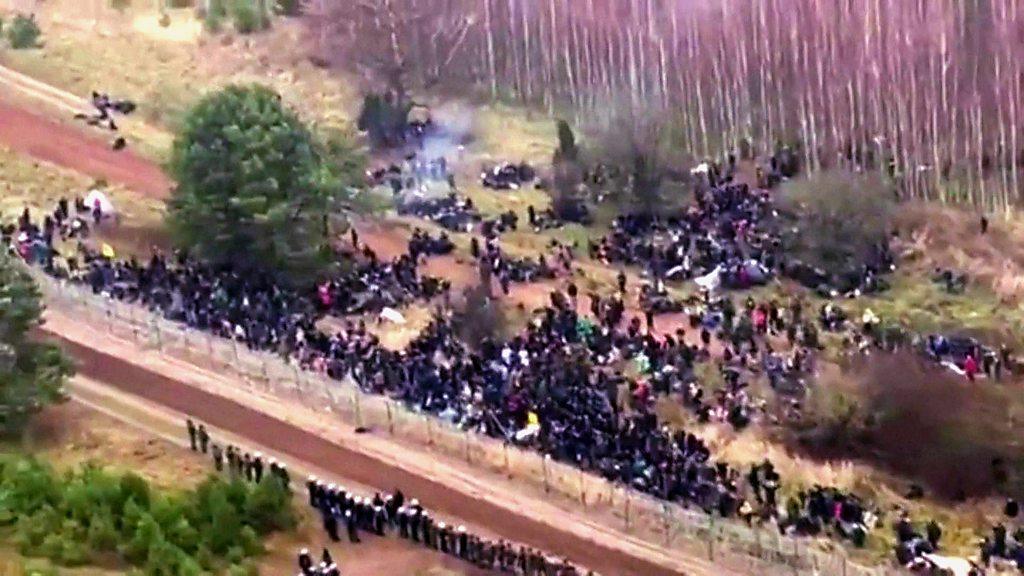
- Published24 September 2021
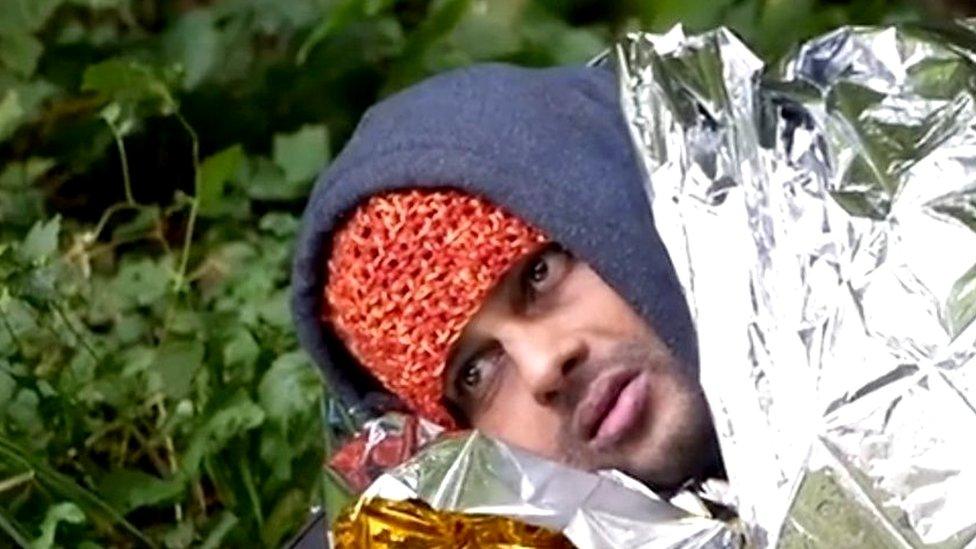
- Published29 October 2021
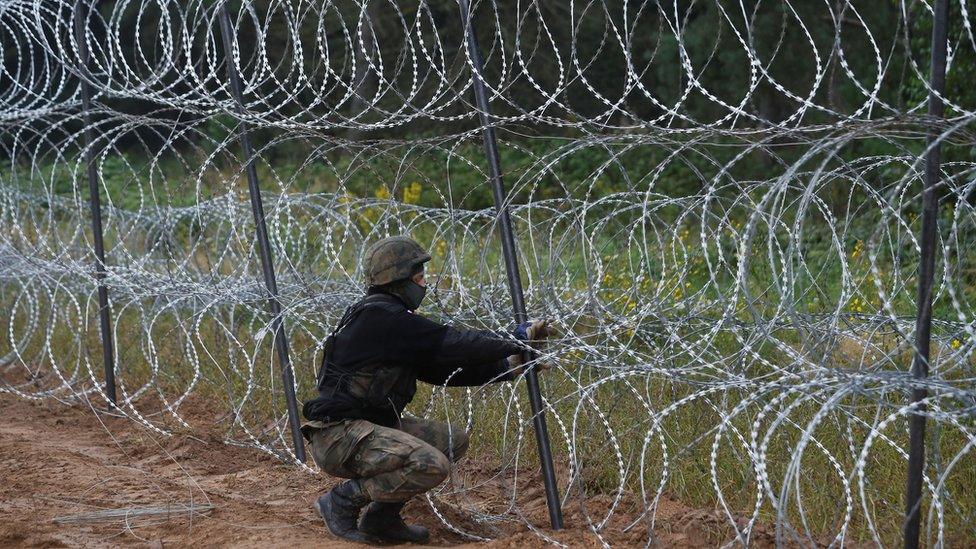
- Published22 October 2021
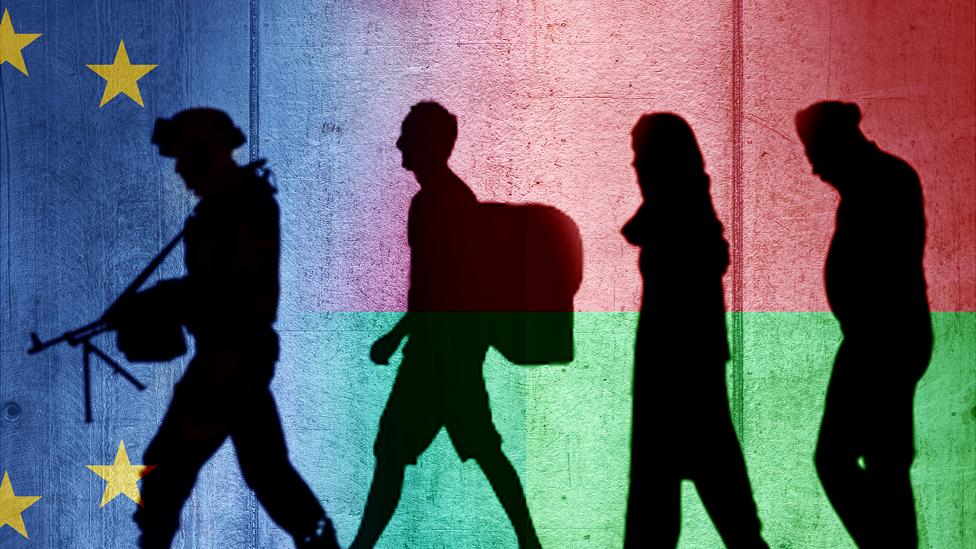
- Published15 October 2021
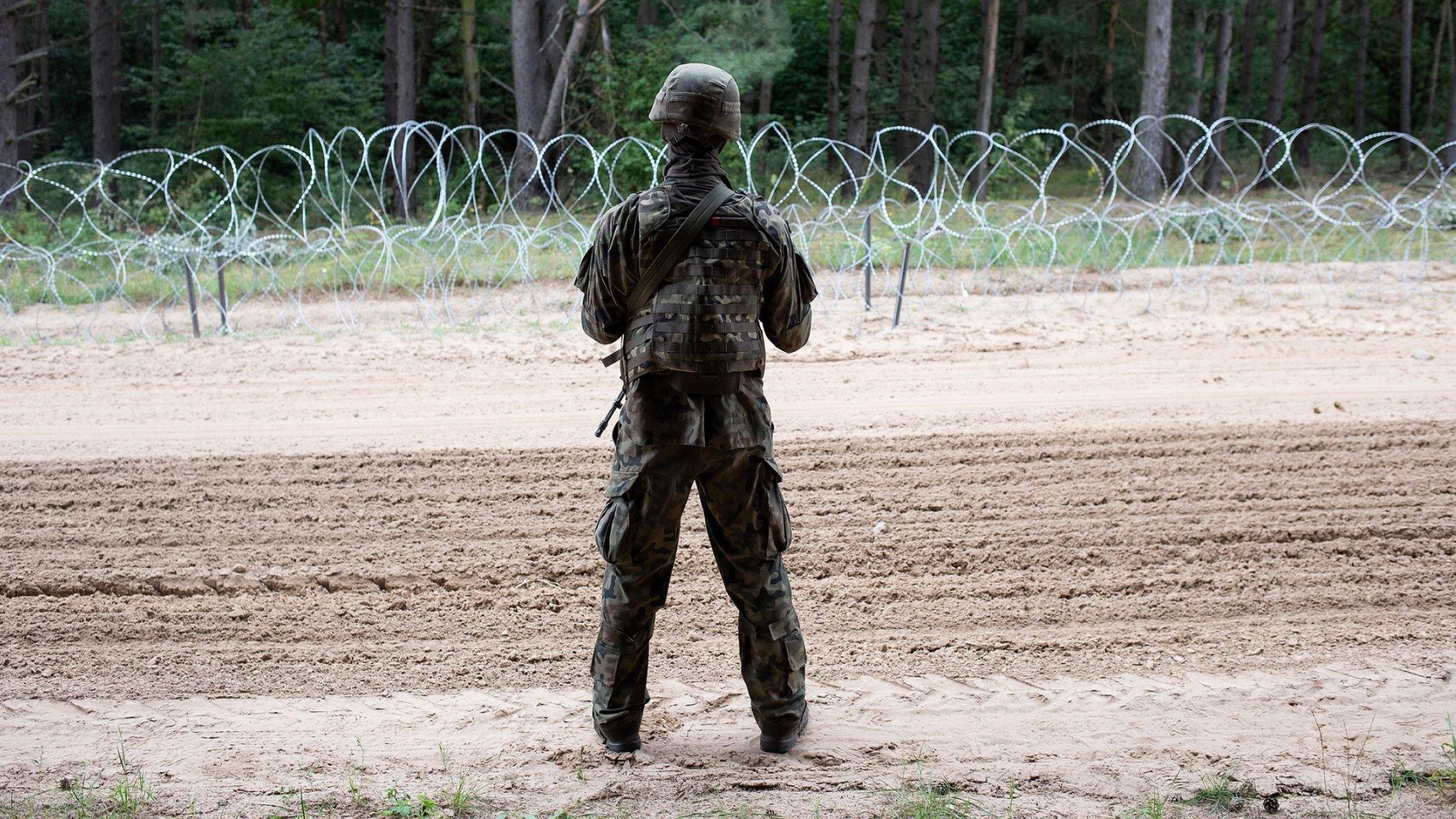
- Published18 August 2021
